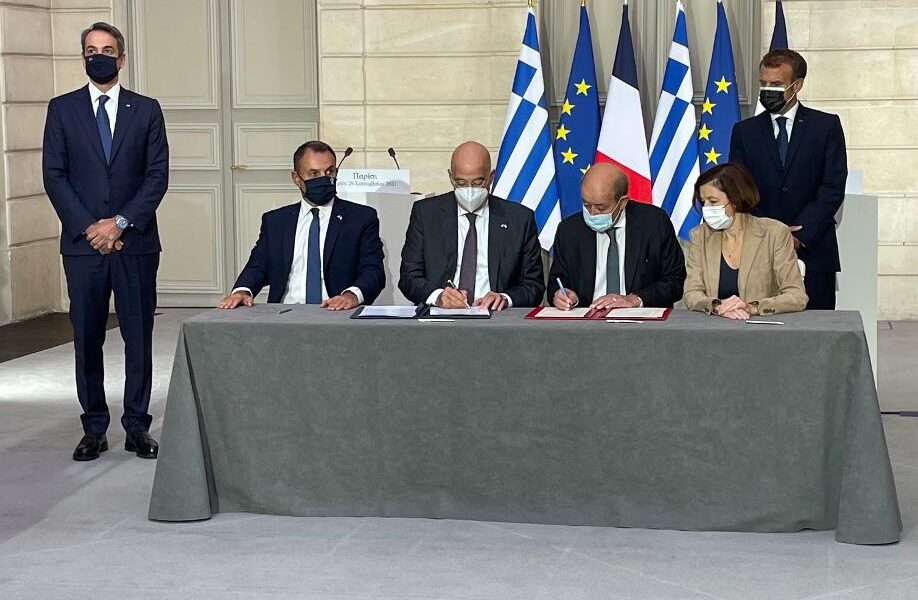The Greek-French agreement in Paris today provides for France’s immediate military assistance to Greece and vice versa, in the event of a third country attacking, even if that country is part of their alliances (such as Turkey, which is a member of NATO too).
At the same time, Greece will receive in record time, 3 + 1 Belhara frigates with full air defense equipment and anti-submarine warfare and capabilities to shoot down air targets at very long distances.
The frigates, with their high technology and long-range weapons systems, will act as a power multiplier in the Aegean and the Eastern Mediterranean, and in addition to their increased capabilities, they will be fully compatible to work with Rafale fighter jets.
According to government officials, the government is equipping the Navy with a view to the future, as the 3 frigates (with an option to buy another) are purchased from Greece at the most advantageous price, with full armament and a record delivery time.
The first state-of-the-art digital frigate is expected to be delivered in 2025 and the last in 2026.
In this way the security of Greece is strengthened.
Greece and France have committed through the strategic partnership agreement, beyond and above existing structures (NATO and EU), to assist each other militarily in case of need.
However, the bilateral agreement also has a purely European dimension, as it is an acceptance of the doctrine of the strategic autonomy of the European Union by the two countries.
In essence, Greece and France, with the bilateral agreement which guarantees the cooperation of the two countries in defense and foreign policy, operate within the framework of their alliances and strengthen the policy of strategic autonomy of the EU.
At the same time, on the table is the provision of 3 state-of-the-art Gowind corvettes (with an option for another one) with full equipment.
Greece moved quickly and secured a very strong defense cooperation after the reclassifications from the AUKUS agreement.
Greece will have three frigates FDI HN (Hellenic Navy), a configuration which has been chosen by our Navy itself.
The ship belongs to the next generation of “digital” frigates, and is equipped with the top SeaFire radar.
The latter is combined with the state-of-the-art ASTER 30 anti-aircraft missiles, in their latest version.
The SeaFire/ASTER 30 combination will offer area air defense to the Fleet Units, at distances exceeding 100 km, while at the same time it will have Anti-Ballistic Abilities.
In other words, for the first time in its history, the Navy will acquire ships that will be able to shoot down air targets at very long distances, while they will also be able to offer protection against ballistic missiles.
The armament is complemented by an advanced 76 mm cannon , but also a RAM system of 21 missiles, which completes the anti-aircraft/anti-missile shield of the ship.
The new frigate, in addition to advanced anti-aircraft capabilities, also has top anti-submarine capabilities, thanks to the world champion sonar CAPTAS-4.
The latter will be combined with the state-of-the-art anti-submarine helicopters MH-60R that Greece recently bought from the U.S. and will be delivered in early 2022.
The anti-submarine armament is complemented by state-of-the-art anti-submarine torpedoes.
Anti-ship weapons include the most advanced “digital” Exocet MM40 Block 3c, capable of long-range impact, while also being able to hit coastal targets.
The new digital frigates is complemented by state-of-the-art electronic systems, which are completed on the world-leading French Combat Information Center SETIS.
What does the “Strategic Partnership for Cooperation in Defense and Security” Greece and France:
- The agreement confirms the close allied relationship developed by both countries, upgrades the geopolitical footprint of Greece in Europe and the region.
- The Agreement contains (Article 2) a mutual defense assistance clause in case one of the two countries is attacked on its territory. In this way, Greece is shielded against threats, especially in the Eastern Mediterranean. At the same time, Article 42 (7) of the Treaty on European Union on the mutual defense clause becomes substantial through the agreement.
- With the agreement, Greece and France exceed the obligations towards each other within the framework of the European Union and NATO. At the same time, they are strengthening the European defense pillar and NATO, as they are two EU member states, but also allies in NATO.
- The Agreement is accompanied by an announcement for the acquisition by the Greek Navy of three French frigates.
- The agreement provides for cooperation in defense and foreign policy. In this way, Greece will play a leading role, as previously announced by Kyriakos Mitsotakis from the TIF, as well as in his statements at the EUMED Summit, in the discussion on the need for strategically autonomous EU.
- The Mediterranean opens roads. The Greek-French strategic partnership agreement is a first big step towards the strategic autonomy of the EU.
- Already from his speech at the UN General Assembly, Kyriakos Mitsotakis spoke about the need to develop the necessary defense capabilities, so that Europe can respond immediately to challenges, in its wider neighborhood, such as the Mediterranean, the Middle East and the Sahel, where NATO will not be “present”.
- The agreement provides for regular consultations between the Foreign and Defense Ministers of the two countries both for security and defense, as well as on regional and international issues, hybrid threats, maritime security and migration.
READ MORE: IT’S OFFICIAL: Franco-Greek Defence Assistance Agreement signed in Paris.


